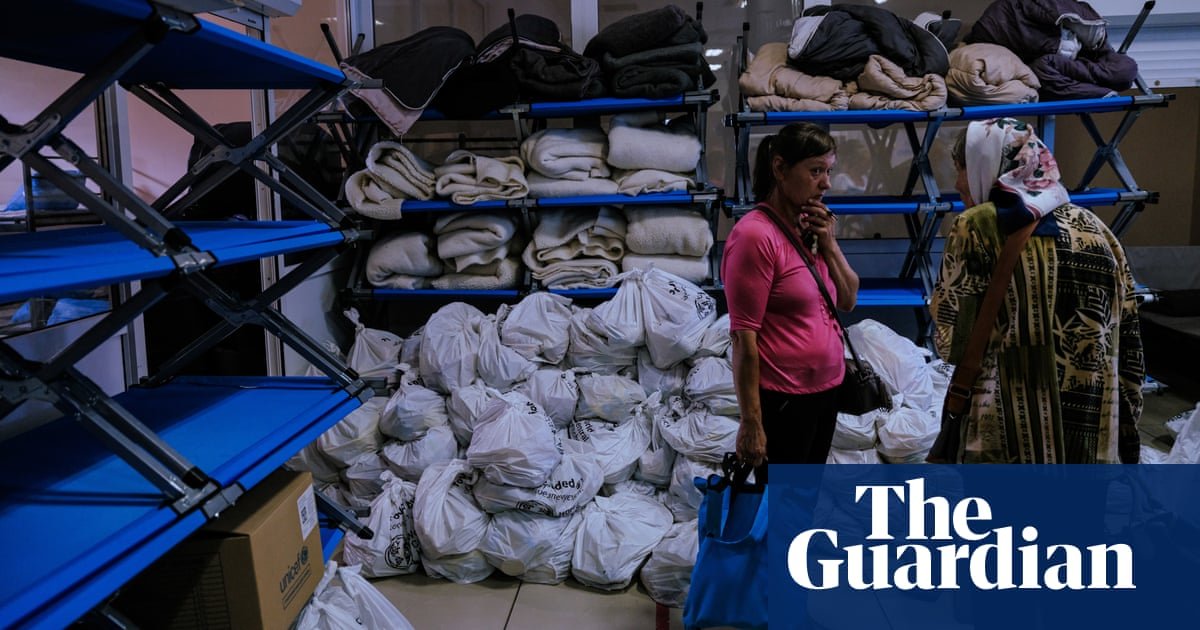Last Tuesday, Oksana and her family could not escape fast enough. Though they did not know it, Ukrainian regular forces had entered Russia for the first time, and Moscow’s military wasted little time in hitting back, bombing their village around seven miles from the border.
“It was 9am and the first glide bomb hit the village,” she said, and its ferocity – “very scary, much bigger” than ordinary shelling – was such that they immediately knew they had to escape. “Our neighbour drove his children first and then came back and picked me and my sister and family,” the mother of two explained.
Like hundreds of others from the Ukrainian borderlands where last week’s surprise attack was launched, Oksana and her family made their way south to Sumy, normally a 40-minute drive away. They have rented a property and were working out what to do next at a crowded refugee centre in the city.
Others lining up to register as internally displaced tell similar stories. While there had been periodic cross-border shelling before, this time was different. “What happened last week was times a hundred,” said Mykola, 69, who had been evacuated with his wife from Yunakivka, five miles from the border, on Sunday.
Ukraine’s civilian authorities had little formal warning of the attack, though some people in the area suspected something was coming. Nevertheless, once it had begun, they announced the mandatory evacuation of 6,000 people from villages 5km to 10km from the border, and it is unclear when they might be able to return.
More fighting is now taking place on the Russian side of the border, though there are occasional strikes into the Ukrainian rear. A small multistorey building beside a residential area in southern Sumy was destroyed by a single missile on Sunday afternoon, injuring eight civilians who lived nearby and throwing up a smoke trail visible across the countryside.
After nearly a week, Ukraine has captured 28 villages inside Kursk oblast, next door to Ukraine’s depopulated Sumy region, according to Alexey Smirnov, the Russian acting regional governor. On Monday, he said that Ukraine’s incursion was up to 12km deep along a 40km front, Russian state media reported.
A few hours later, Ukraine suggested the territory it controlled was much larger. President Volodymyr Zelenskiy released a clip of the head of the armed forces, Oleksandr Syrskyi, delivering a progress report. “Currently, we control about 1,000 sq km of the territory of the Russian Federation,” he said.
The areas remain modest compared with the vast size of Russia and Ukraine overall. But Ukraine’s attack marks the first time that a part of Russia has been occupied since the second world war – and president Vladimir Putin promised “a worthy response” on Monday to an attack whose motivation he presented as largely political.
“The main task, of course, is for the defence ministry to squeeze out, to knock out the enemy from our territories,” Putin said, though so far there has been no sign that Russian forces have been able to halt the Ukrainian invaders, who appeared to be gaining ground around Sudzha, five miles inside the border.
The Russian president, in his most detailed remarks yet about the incursion, also said that Ukraine “with the help of its western masters” was trying to improve its position before any possible peace negotiations – suggesting he believed that Ukraine was trying to hold land for a possible swap of territory when the war ends.
There is little sign of serious peace talks, though the Kremlin has previously indicated that it is willing to end the war along the current lines of control, which would leave Russia holding about 18% of Ukraine. Ukraine has repeatedly said it wants to restore its internationally recognised borders and seeks membership of Nato, which Russia has previously rejected as unacceptable.
In Sumy, the 150 or so refugees waiting for help appeared to show little interest in such an immediate peace, even though the danger close to the border means many said they had little immediate expectation of returning to their homes.
Nobody, however, blamed their displacement on Ukraine’s surprise attack, arguing instead that attack was a necessary form of defence. Liudmyla, 54, from the village of Khotin, was at times tearful as she said she worried for the safety of her husband, who is still trying to harvest soya beans from their border farm.
But asked whether it was right to attack from the area where she lived, causing such danger to her family, she immediately brightened. “I felt euphoria, euphoria,” Liudmyla said. “Absolutely, 100% – they should have done it earlier. I wish I could have done it myself.”
Mykola, who lost his right hand before the war, was of a similar mind. “We should have done something. We need to liberate our territory somehow. Last year, we failed in the offensive, but this year we seem to be in a better state with western aid,” he said, even praising the support of the former British prime minister Boris Johnson.
“So we hope that they will succeed and keep on succeeding, because as far as we know, when they succeed, we’ll get even more help from Europe and America,” he added.
